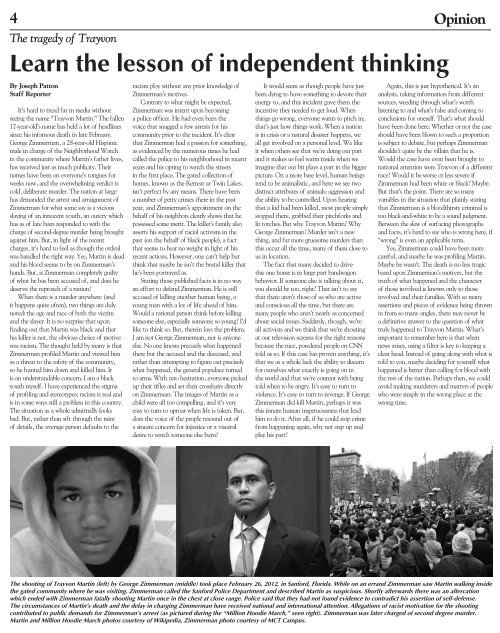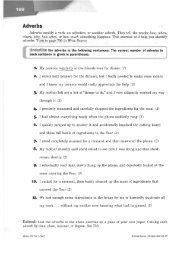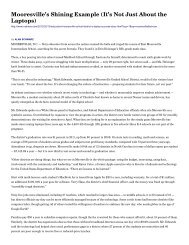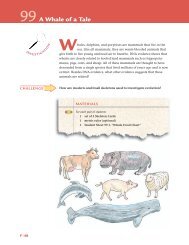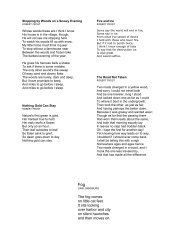8 - Merrillville Community School
8 - Merrillville Community School
8 - Merrillville Community School
Create successful ePaper yourself
Turn your PDF publications into a flip-book with our unique Google optimized e-Paper software.
4 Opinion<br />
The tragedy of Trayvon<br />
Learn the lesson of independent thinking<br />
By Joseph Patton<br />
Staff Reporter<br />
It’s hard to tread far in media without<br />
seeing the name “Trayvon Martin.” The fallen<br />
17-year-old’s name has held a lot of headlines<br />
since his infamous death in late February.<br />
George Zimmerman, a 28-year-old Hispanic<br />
male in charge of the Neighborhood Watch<br />
in the community where Martin’s father lives,<br />
has received just as much publicity. Their<br />
names have been on everyone’s tongues for<br />
weeks now, and the overwhelming verdict is<br />
cold, deliberate murder. The nation at large<br />
has demanded the arrest and arraignment of<br />
Zimmerman for what some say is a vicious<br />
slaying of an innocent youth, an outcry which<br />
has as of late been responded to with the<br />
charge of second-degree murder being brought<br />
against him. But, in light of the recent<br />
charges, it’s hard to feel as though the ordeal<br />
was handled the right way. Yes, Martin is dead<br />
and his blood seems to be on Zimmerman’s<br />
hands. But, is Zimmerman completely guilty<br />
of what he has been accused of, and does he<br />
deserve the reproach of a nation?<br />
When there is a murder anywhere (and<br />
it happens quite often), two things are duly<br />
noted: the age and race of both the victim<br />
and the slayer. It is no surprise that upon<br />
finding out that Martin was black and that<br />
his killer is not, the obvious choice of motive<br />
was racism. The thought held by many is that<br />
Zimmerman profiled Martin and viewed him<br />
as a threat to the safety of the community,<br />
so he hunted him down and killed him. It<br />
is an understandable concern. I am a black<br />
youth myself. I have experienced the stigma<br />
of profiling and stereotypes; racism is real and<br />
is in some ways still a problem in this country.<br />
The situation as a whole admittedly looks<br />
bad. But, rather than sift through the mire<br />
of details, the average person defaults to the<br />
racism ploy without any prior knowledge of<br />
Zimmerman’s motives.<br />
Contrary to what might be expected,<br />
Zimmerman was intent upon becoming<br />
a police officer. He had even been the<br />
voice that snagged a few arrests for his<br />
community prior to the incident. It’s clear<br />
that Zimmerman had a passion for something,<br />
as evidenced by the numerous times he had<br />
called the police to his neighborhood in recent<br />
years and his opting to watch the streets<br />
in the first place. The gated collection of<br />
homes, known as the Retreat at Twin Lakes,<br />
isn’t perfect by any means. There have been<br />
a number of petty crimes there in the past<br />
year, and Zimmerman’s appointment on the<br />
behalf of his neighbors clearly shows that he<br />
possessed some merit. The killer’s family also<br />
asserts his support of racial activism in the<br />
past (on the behalf of black people), a fact<br />
that seems to bear no weight in light of his<br />
recent actions. However, one can’t help but<br />
think that maybe he isn’t the brutal killer that<br />
he’s been portrayed as.<br />
Stating those published facts is in no way<br />
an effort to defend Zimmerman. He is still<br />
accused of killing another human being, a<br />
young man with a lot of life ahead of him.<br />
Would a rational person think before killing<br />
someone else, especially someone so young? I’d<br />
like to think so. But, therein lays the problem.<br />
I am not George Zimmerman, nor is anyone<br />
else. No one knows precisely what happened<br />
there but the accused and the deceased, and<br />
rather than attempting to figure out precisely<br />
what happened, the general populace turned<br />
to arms. With zero hesitation, everyone picked<br />
up their rifles and set their crosshairs directly<br />
on Zimmerman. The images of Martin as a<br />
child were all too compelling, and it’s very<br />
easy to turn to uproar when life is taken. But,<br />
does the voice of the people resound out of<br />
a sincere concern for injustice or a visceral<br />
desire to watch someone else burn?<br />
It would seem as though people have just<br />
been dying to have something to devote their<br />
energy to, and this incident gave them the<br />
incentive they needed to get loud. When<br />
things go wrong, everyone wants to pitch in;<br />
that’s just how things work. When a nation<br />
is in crisis or a natural disaster happens, we<br />
all get involved on a personal level. We like<br />
it when others see that we’re doing our part<br />
and it makes us feel warm inside when we<br />
imagine that our bit plays a part in the bigger<br />
picture. On a more base level, human beings<br />
tend to be animalistic, and here we see two<br />
distinct attributes of animals: aggression and<br />
the ability to be controlled. Upon hearing<br />
that a kid had been killed, most people simply<br />
stopped there, grabbed their pitchforks and<br />
lit torches. But why Trayvon Martin? Why<br />
George Zimmerman? Murder isn’t a new<br />
thing, and far more gruesome murders than<br />
this occur all the time, many of them close to<br />
us in location.<br />
The fact that many decided to drive<br />
this one home is in large part bandwagon<br />
behavior. If someone else is talking about it,<br />
you should be too, right? That isn’t to say<br />
that there aren’t those of us who are active<br />
and conscious all the time, but there are<br />
many people who aren’t nearly as concerned<br />
about social issues. Suddenly, though, we’re<br />
all activists and we think that we’re shouting<br />
at our television screens for the right reasons<br />
because the nice, powdered people on CNN<br />
told us so. If this case has proven anything, it’s<br />
that we as a whole lack the ability to discern<br />
for ourselves what exactly is going on in<br />
the world and that we’re content with being<br />
told when to be angry. It’s easy to turn to<br />
violence. It’s easy to turn to revenge. If George<br />
Zimmerman did kill Martin, perhaps it was<br />
this innate human impetuousness that lead<br />
him to do it. After all, if he could stop crime<br />
from happening again, why not step up and<br />
play his part?<br />
Again, this is just hypothetical. It’s an<br />
analysis, taking information from different<br />
sources, weeding through what’s worth<br />
listening to and what’s false and coming to<br />
conclusions for oneself. That’s what should<br />
have been done here. Whether or not the case<br />
should have been blown to such a proportion<br />
is subject to debate, but perhaps Zimmerman<br />
shouldn’t quite be the villain that he is.<br />
Would the case have even been brought to<br />
national attention were Trayvon of a different<br />
race? Would it be worse or less severe if<br />
Zimmerman had been white or black? Maybe.<br />
But that’s the point. There are so many<br />
variables in the situation that plainly stating<br />
that Zimmerman is a bloodthirsty criminal is<br />
too black-and-white to be a sound judgment.<br />
Between the slew of surfacing photographs<br />
and facts, it’s hard to say who is wrong here, if<br />
“wrong” is even an applicable term.<br />
Yes, Zimmerman could have been more<br />
careful, and maybe he was profiling Martin.<br />
Maybe he wasn’t. The death is no less tragic<br />
based upon Zimmerman’s motives, but the<br />
truth of what happened and the character<br />
of those involved is known only to those<br />
involved and their families. With so many<br />
assertions and pieces of evidence being thrown<br />
in from so many angles, there may never be<br />
a definitive answer to the question of what<br />
truly happened to Trayvon Martin. What’s<br />
important to remember here is that when<br />
news arises, using a filter is key to keeping a<br />
clear head. Instead of going along with what is<br />
told to you, maybe deciding for yourself what<br />
happened is better than calling for blood with<br />
the rest of the nation. Perhaps then, we could<br />
avoid making murderers and martyrs of people<br />
who were simply in the wrong place at the<br />
wrong time.<br />
The shooting of Trayvon Martin (left) by George Zimmerman (middle) took place February 26, 2012, in Sanford, Florida. While on an errand Zimmerman saw Martin walking inside<br />
the gated community where he was visiting. Zimmerman called the Sanford Police Department and described Martin as suspicious. Shortly afterwards there was an altercation<br />
which ended with Zimmerman fatally shooting Martin once in the chest at close range. Police said that they had not found evidence to contradict his assertion of self-defense.<br />
The circumstances of Martin’s death and the delay in charging Zimmerman have received national and international attention. Allegations of racist motivation for the shooting<br />
contributed to public demands for Zimmerman’s arrest (as pictured during the “Million Hoodie March,” seen right). Zimmerman was later charged of second degree murder.<br />
Martin and Million Hoodie March photos courtesy of Wikipedia, Zimmerman photo courtesy of MCT Campus.


